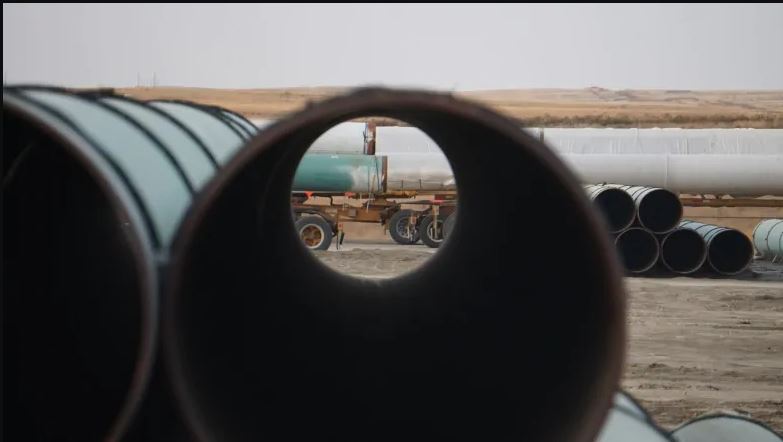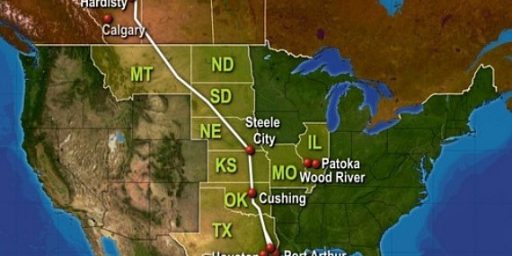Keystone XL Developer Abandons Project
The project that has been on-again, off-again since 2008 seems to be off for good.

AP:
The sponsor of the Keystone XL crude oil pipeline pulled the plug on the contentious project Wednesday after Canadian officials failed to persuade President Joe Biden to reverse his cancellation of its permit on the day he took office.
Calgary-based TC Energy said it would work with government agencies “to ensure a safe termination of and exit” from the partially built line, which was to transport crude from the oil sand fields of western Canada to Steele City, Nebraska.
Construction on the 1,200-mile (1,930-kilometer) pipeline began last year when former President Donald Trump revived the long-delayed project after it had stalled under the Obama administration. It would have moved up to 830,000 barrels (35 million gallons) of crude daily, connecting in Nebraska to other pipelines that feed oil refineries on the U.S. Gulf Coast.
Biden canceled the pipeline’s border crossing permit in January over longstanding concerns that burning oil sands crude could make climate change worse and harder to reverse.
Canadian Prime Minister Justin Trudeau had objected to the move , raising tensions between the U.S. and Canada. Officials in Alberta, where the line originated, expressed frustration in recent weeks that Trudeau wasn’t pushing Biden harder to reinstate the pipeline’s permit.
Alberta invested more than $1 billion in the project last year, kick-starting construction that had stalled amid determined opposition to the line from environmentalists and Native American tribes along its route.
Alberta officials said Wednesday they reached an agreement with TC Energy, formerly known as TransCanada, to exit that partnership. The company and province plan to try to recoup the government’s investment, although neither offered any immediate details on how that would happen.
“We remain disappointed and frustrated with the circumstances surrounding the Keystone XL project, including the cancellation of the presidential permit for the pipeline’s border crossing,” Alberta Premier Jason Kenney said in a statement.
The province had hoped the pipeline would spur increased development in the oil sands and bring tens of billions of dollars in royalties over decades.
In the short term at least, this may be a big win for TC Energy. They’re able to use to cover of Biden’s decision to get out of a project that looks to be a whole lot less lucrative than when it started. The oil boom of 2008 is long behind us. But it’s a big blow to investors and others who relied on the project.
I’ve only paid passing attention to this fight as it’s unfolded over the years and don’t have a firm view as to whether the environmental risk posed by building and operating the pipeline is outweighed by the economic benefit. But I continue to believe that it makes no sense at all to make a massive project of this sort—one that will costs billions and take years to construct and that involves a foreign ally and multiple domestic constituencies—to rest on the whims of whoever happens to be President at the moment.
It seems obvious that there should be an approval process in place that takes into consideration international treaties, US environmental laws and regulations, as well as inputs from impacted states and tribal groups. And, if a project is approved, the contract should be honored so long as the terms continue to be met.



Good news.
No open forum today?
Oil sands are messy and abrasive prior to processing, and the idea of moving them along a massive pipeline has always been of dubious merit. The economics finally caught up.
@CSK: It is up now. I had thought about it and then forgot about scheduling it last night.
TransCanada and Alberta have an alternate route. Go west to British Columbia and Vancouver. May not be as economically viable as sending the crude to the US but economics seem secondary in this project.
Just a note in passing that Native Americans have won a great victory in this event.
This was a private project that would have required a great deal of government intervention and involvement (granting and seizing rights of way, etc). For the government to intervene to help private individuals make money there has to be a compelling national interest. That case was not made.
In general, I think it is too hard to get projects off the ground. But in this case I think the pipeline was legitimately blocked. It is not in the national interest. Trump and his corrupt cronies put a thumb on the scale when they came in and tried to resurrect it. Because they were incompetent it didn’t work. But it did drag this out longer than needed.
As the IEA recently confirmed, limiting global warming to no more than 1.5C means that “no new fossil fuel projects” should be greenlit. The carbon math shows that existing fossil fuel extraction projects are sufficient to push us beyond 1.5C. Had it been built, KXL would have operated for decades and would have facilitated an expansion of one of the dirtiest oils in the world. We have only a limited time to pivot to decarbonization, and misguided projects like this one only make it harder.